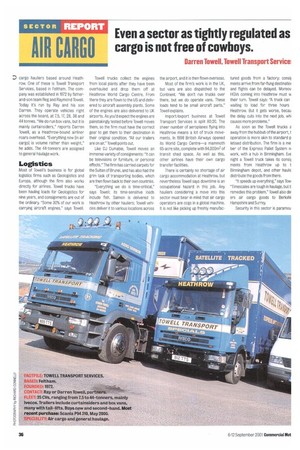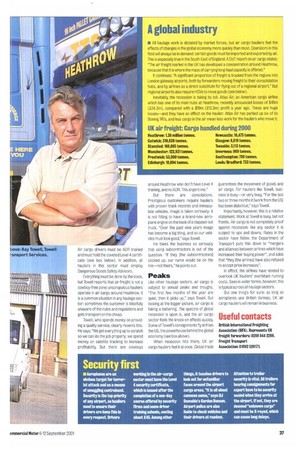Even a sector as tightly regulated as cargo is not free of cowboys.
Page 36

Page 37

If you've noticed an error in this article please click here to report it so we can fix it.
Darren Towel!, Towell Transport Service
Towell trucks collect the engines from local plants after they have been overhauled and drop them off at Heathrow World Cargo Centre. From there they are flown to the US and delivered to aircraft assembly plants. Some of the engines are also delivered to UK airports. As you'd expect the engines are painstakingly tested before Towell moves them, so the firm must have the correct gear to get them to their destination in their original condition. "All our trailers are on air," Towell points out.
Like DJ Dumabie, Towell moves an immense variety of consignments; "it can be televisions or furniture, or personal effects." The firm has carried carpets for the Sultan of Brunei, and has also had the grim task of transporting bodies, which are then flown back to their own countries.
"Everything we do is time-critical," says Towell; its time-sensitive loads include fish. Salmon is delivered to Heathrow by other hauliers; Towell vehicles deliver it to various locations across the airport, and it is then flown overseas.
Most of the firm's work is in the UK, but vans are also dispatched to the Continent. We don't run trucks over there, but we do operate vans. These loads tend to be small aircraft parts," Towell explains.
Import/export business at Towel! Transport Services is split 80:20. The sheer number of aeroplanes flying into Heathrow means a lot of truck movements. In 1998 British Airways opened its World Cargo Centre—a mammoth 65-acre site, complete with 94,000m2 of transit shed space. As well as this, other airlines have their own cargo transfer facilities.
There is certainly no shortage of air cargo accommodation at Heathrow, but nevertheless Towell says downtime is an occupational hazard in this job. Any hauliers considering a move into this sector must bear in mind that air cargo operators are cogs in a global machine. It is not like picking up freshly manufac
tured goods from a factory: consil merits arrive from far-flung destinatioi and flights can be delayed. Moreov HGVs coming into Heathrow must w their turn. Towell says: "A truck can waiting to load for three hours Heathrow. But it gets worse, becau the delay cuts into the next job, whl causes more problems."
As soon as the Towell trucks a away from the hubbub of the airport, t operation is more akin to standard p letised distribution. The firm is a me ber of the Express Pallet System n1 work, with a hub in Birmingham. EVE night a Towell truck takes its conq ments from Heathrow up to t Birmingham depot, and other hauliE distribute the goods from there.
"It speeds up everything," says Tow "Timescales are tough in haulage, but ti remedies this problem." Towell also del ers air cargo goods to Berkshil Hampshire and Surrey.
Security in this sector is paramou Air cargo drivers must be ADR trained and must hold the coveted Level 4 certificate (see box below). In addition, all hauliers in this sector must employ Dangerous Goods Safety Advisors.
Everything must be done by the book, but Towell reports that air-freight is not a cowboy-free zone; unscrupulous hauliers operate in air cargo around Heathrow. It is a common situation in any haulage sector: sometimes the customer is blissfully unaware of the rules and regulations and gets transport on the cheap.
Towell, who spends money on providing a quality service, clearly resents this. He says: "We get everything up to scratch so we can do the job properly; we spend money on satellite tracking to increase profitability. But there are cowboys around Heathrow who don't have Level 4 training, and no ADS. This angers me.'
But there are consolations. Prestigious customers require hauliers with proven track records and immaculate vehicles. Image is taken seriously: it is not fitting to have a brand-new aeroplane engine on the back of a clapped-out truck. "Over the past nine years image has become a big thing, and so our vehicles must look good," says Towell.
He takes the business so seriously that using subcontractors is out of the question. "If they [the subcontractors] cocked up, our name would be on the line—not theirs," he punts out.
Peaks
Like other haulage sectors, air cargo is subject to annual peaks and troughs. "The first few months of the year are quiet, then it picks up," says Towell. Rut looking at the bigger picture, air cargo is taking a battering. The spectre of global recession is upon is, and the alcargo sector feels the knock-on effects quickly. Some of Towell's consignments fly in from the US, the powerhouse behind the global economy (see box above).
When recession hits there, UK air cargo hauliers feel it at once. Global trade guarantees the movement of goods and air cargo. For hauliers like Towell, business is busy—or very busy. "For the last two or three months it [work from the US] has been diabolical," says Towel!.
Importantly, however, this is a relative statement. Work at Towell is busy, but not frantic. Air cargo is not completely proof against recession: like any sector it is subject to ups and downs. Rates in the sector have fallen: the Department of Transport puts this down to "mergers and alliances between airlines which have increased their buying power", and adds that "they [the airlines] have also refused to accept price increases".
In effect, the airlines have tended to overlook UK hauliers' exorbitant running costs. Seen in wider terms, however, this is typical across all haulage sectors.
But one thing's for sure: as long as aeroplanes use British tarmac, UK air cargo hauliers will remain in business.
Useful contacts
British International Freighting Association (BIM). Represents UK freight forwarders: 0208 844 2266. Freight Transport Association: 01892 526171.




































































































































